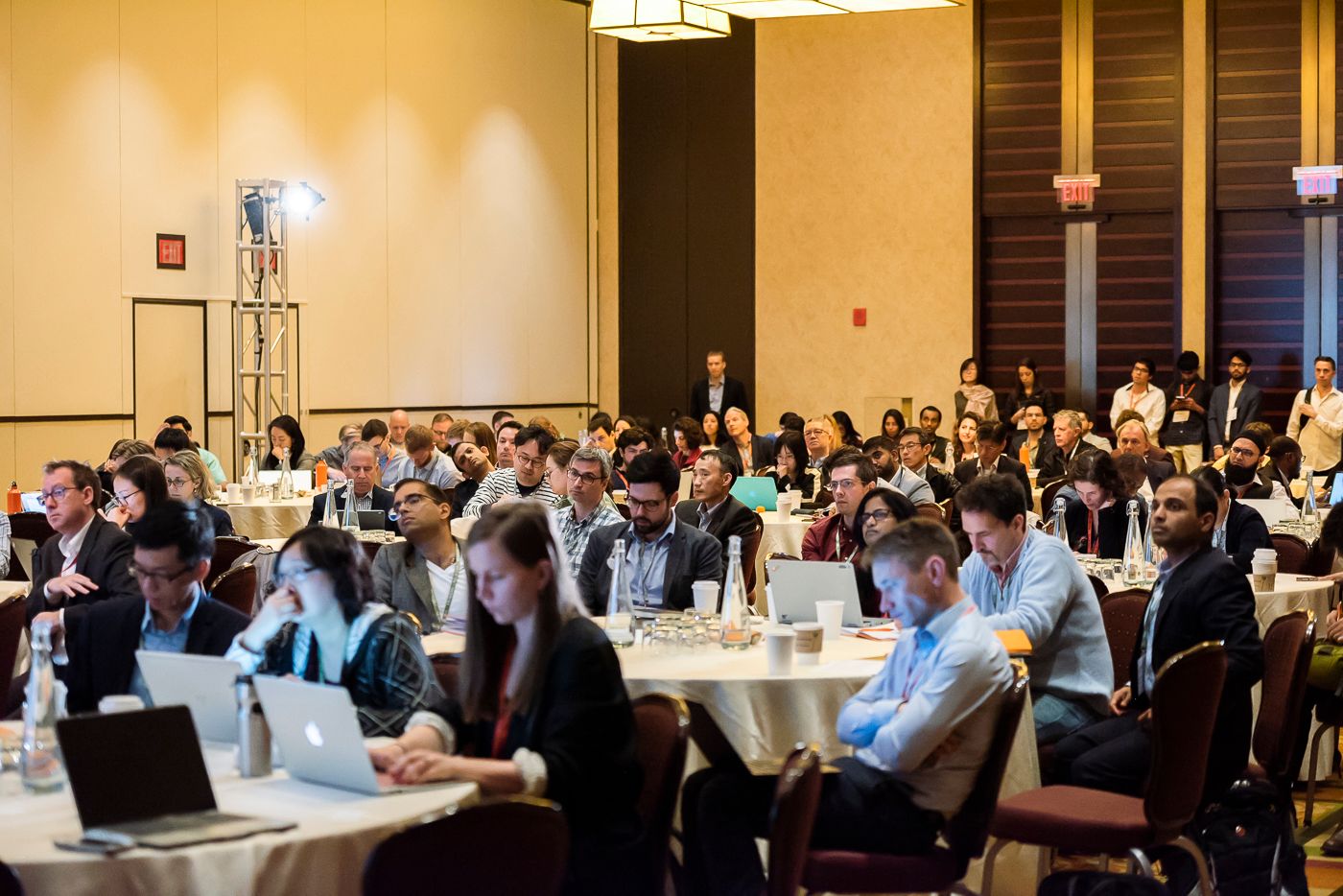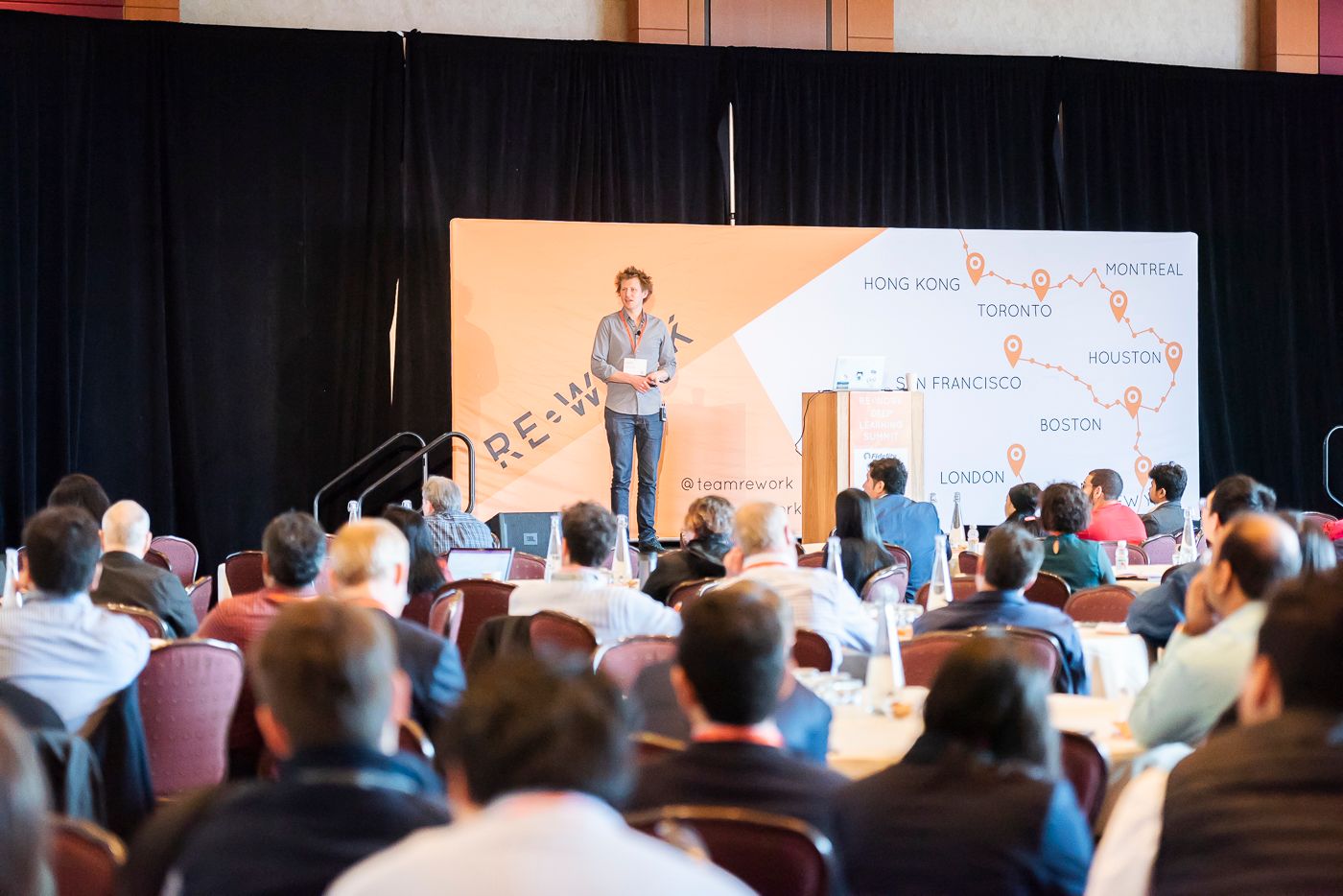The Deep Learning Summit returned to Boston today for the fifth time, this year accompanied by the Deep Learning in Healthcare summit. Recognized as the only deep learning summit to facilitate both high-level technical discussion and industry application methods, RE•WORK welcomed some of the brightest industry minds to the InterContinental Boston for two days of in-depth conversation, networking, presentations, panels, and more. The two-track summit welcomed a diverse range of attendees, from Founders, CEOs, and Data Scientists, to Professors, PhD Students, Ethics Officers and many more.
Pre-summit networking had already begun on the event app, Attendify, the newest addition to our summits in the pursuit of becoming paper-free, whilst also allowing attendees to build their own personalized online agenda across both tracks, participate in speaker-led polls and instant message attendees to arrange meetings as well as commenting on talks from the day:
"I’m here to explore the impact of AI on education. I’d love to exchange ideas/views about that." - Marco Masoni
"Any conference in which the name starts with 'AI' or 'Deep Learning' is probably going to be pretty good! Deep Learning in Healthcare Summit." - John Pace
"A great introduction to multi-GPU tensorflow by @ntenenz at #reworkHealth." - Mark Gooding
“Just created my own personalised schedule for the RE•WORK Healthcare Summit in Boston! What a great idea!" - Adele Hill
With registration and breakfast complete, the compères from both tracks, Andrei Polzounov of Blue River Technology and Amir Tahmasebi of Codametrix, presented their opening remarks, giving an overview of what attendees could expect over the next two days.
With the formalities out of the way, Brandon Rohrer, Principal Data Scientist at iRobot (previously Facebook), took to the stage and gave a greater insight into the intricacies of his role, with a considerable focus on his work in neural networks, giving the audience an insight into the companies ‘black box’ of data. Brandon went on to explain the malleable nature of Machine Learning in application with a simple analogy:
“Machine learning is like travelling, getting from one place to another… scaling a cliff or crossing an ocean, there are many ways to travel the same distance.”
Brandon continued to suggest that finding the right model can comes as a result of significant trial and error:
“Choosing the right model for the problem is not always easy, but the more trials and experience that you have and how much you understand the domain and data, the better your chance at picking the right model for that specific problem.”
The Healthcare track was also underway, with James Cai, Head of Data Science at Roche, discussing the necessity of artificial intelligence (AI) in healthcare and how it can be applied in early clinical development of new drugs. That said, James also noted that the results we are currently seeing are very early examples:
"AI has demonstrated tremendous potential in relation to translational research, however, we are in early phase, meaning that we must constantly explore and embrace new opportunities."
Human behaviour was also a common thread on both tracks, highlighted no more so than in Zoya Bylinski’s presentation on human attention to photographs and visualisations. Zoya detailed some of the image processing algorithms and image capturing characteristics used at Adobe, which are in turn, are used to develop application models and therefore Adobe's product:
"Machine Learning is getting closer and closer to changing the graphic design world for good. We have to be looking at the connections between peoples visual patterns and the link this has to their memory."
Zoya also recognised that whilst AI may be close to changing graphic design beyond measure, there are still a range of current restrictions including a lack of suitable data, difficulty to scale algorithms and the inability to create a uniform design.

The final presentation of the morning on the Deep Learning stage saw Kelly Davis of Mozilla explain the necessity of creating an open source model for speech recognition. Whilst speech recognition software is recognised as a commonly used tool across the board in 2019, Kelly suggested that without the development of a single model of use, large data sets would be unable to function on smart devices:
“One of the things we tried to do in the past year was create small platform support which means a simplified model which can then work in real time, even on smartphones."
Lunch saw further networking opportunities and a chance for attendees to explore the exhibition space and hear from Fidelity Investments, Zepl, Falcon AI, Mirada Medical and more. Attendees also congregated for the Deep Dive Lunch and Learn session, joining some of the speakers for a chance to ask further questions on current works and challenges faced in a smaller and more intimate setting. The break also saw attendees, and those following along from home, reflecting on the morning’s talks:
Really enjoyed talk by @janosaperge on all the interesting deep learning applications going on at @Aetna. Very similar to interests and approaches we have at @EarlySignal / @cohenbioscience. #reworkHEALTH #reworkDL #DeepLearning #healthcare
— Kevin Urban (@krbnite) May 23, 2019
Great talk by Brandon Roher of @iRobot about peeking inside the dreaded black box, here at the #reworkDL summit in boston! #DeepLearning #AI pic.twitter.com/twQqiWFtfn
— AI Just Got Human (@toposlabs) May 23, 2019
A great introduction to multi-GPU tensorflow by @ntenenz at #reworkHealth. #AI #healthcare pic.twitter.com/KEic28P92L
— Mark Gooding (@SciChief) May 23, 2019
Back in the session rooms, Sadid Hasan of Philips Research took to the stage on the healthcare track, discussing the complexity of problem-solving in relation to clinical information extraction and natural language inference, with a specific focus on deep learning application methods. Dr. Sadid suggested that one of his main challenges is the sensitivity of data with the need for an effective de-identification model for patients data. This can, however, induce 'noise' leading to misidentification of data and information downstream.
The afternoon also saw the addition of a third track, dedicated to Deep Dive sessions, allowing speakers to delve deeper into specific topics and for guests to experience a variety of engaging session styles. Founder of the AI Ethics Lab, Cansu Canca, welcomed attendees to share ethical dilemmas that may have arisen in their companies of late, suggesting that the 'buzzword' of ethics needs to be recognised as so much more than that:
"One way to think about ethics is thinking what is beneficial for as many beings as possible. Today we going to focus on autonomy and justice, not just the simplified 'benefits vs harm model."
Back on the Deep Learning track, CEO and Co-Founder of Affectiva, Rana el Kaliouby argued the necessity of humanizing AI. The pioneer of artificial emotional intelligence discussed the rapid rate at which artificial intelligence is becoming ingrained in society alongside the high IQ which it possesses. That said, Rana also recognised the need to monitor the low-level of emotional intelligence currently seen in AI, and the human viewpoint on this:
"Trust is a social contract, we need to redefine the human relationship with AI. Think of it as a two way street, can AI trust us? A focus now needs to be put onto the emotional intelligence of AI, stop solely looking at IQ"

Day one came to a close with a panel discussion taking place on both tracks. The Deep Learning in Healthcare Summit brought together Niels Bantilan, ML Engineer at Talkspace, Akane Sano, Assistant Professor at Rice University and Jordan Smoller, Director of Massachusetts General Hospital to discuss the impacts of machine learning on mental healthcare.
The panel gave attendees a lot of food for thought with many posting their thoughts on Attendify:
"This discussion does make me wonder if we may have to worry about the mental health of AI in the future..." - Mark Golding
"Very moving talk on the healthcare stage." - Adele Hill
"With online therapy, anyone can get help without travelling to an office, for significantly less money... mental health and AI...." - Richard Mallah
A common theme throughout the day was ethics. This was again covered in the final discussion on the Deep Learning track. Our panel of experts, explained from their perspective the considerations needed for ethical practices and how these can impact the implementation of machine learning in business and real-world settings:
"We need to be able to transfer data from country to country without the bias that comes with it. How can we reduce bias? There is not a lot of awareness from companies when it comes to equality and fairness." - Audace Nakeshimana
"AI fairness is new to business. We still do not have good sense of what are the best practices for implementation. For the vast majority companies, ethics is not a priority. Some companies have dedicated groups for this, but how can we create our own rules and legislation?" Alice Xiang
Having given attendees a lot to consider, both panels made their closing remarks, bringing day one of the summit to a close. Post-panel, attendees gathered for networking drinks to reflect on all of the information communicated throughout the day.
Keep up to date with day two on our social media channel @reworkDL and our hashtags #reworkDL and #reworkHEALTH.

